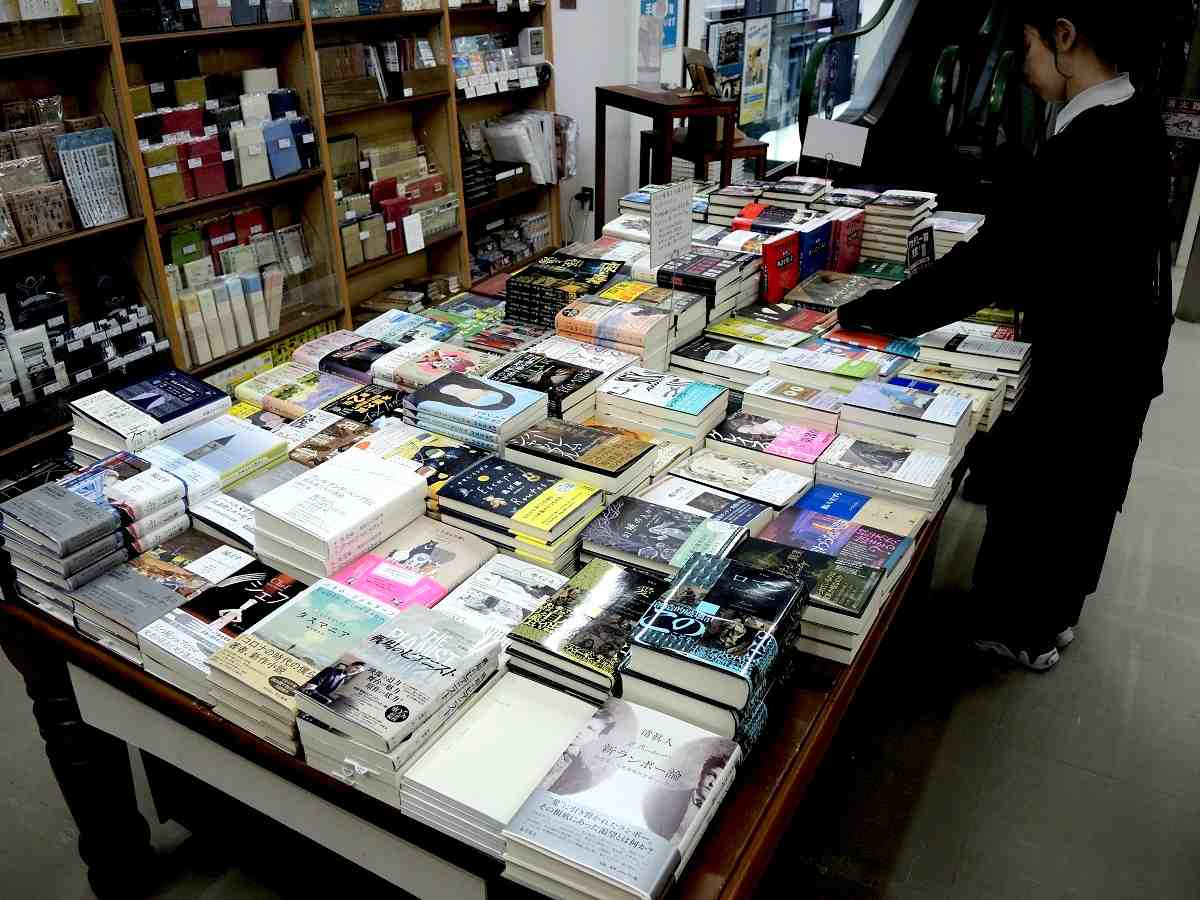EU Works to Find More Readers for Its New Fiction in Japan; Translators of Lesser-known Languages Face Tough Market

European literary works are on display at Junkudo’s Ikebukuro store in Toshima, Tokyo.
16:39 JST, February 7, 2024
The European Union has launched a new campaign to promote literature from the bloc among booklovers in Japan. The EU boasts an impressive diversity of voices, but works from small European countries can have a hard time making it into the hands of readers here. Publishers and translators are watching closely to see if contemporary European literature can gain a stronger foothold in the Japanese market.
“Baltic literature is very unknown in Japan and that’s why it should be very interesting for Japanese readers,” said Lithuanian Ambassador Aurelijus Zykas, speaking to a group of Japanese publishers at an event at his embassy on Feb. 2.
The EU is inviting Japanese publishers to tour the Baltic states from Feb. 21 to 27. Participants will visit bookfairs in Lithuania and Latvia and and literature-related facilities in all three countries, and meet authors and other locals in the publishing industry.
This is the first time the EU has organized such an event, and it hopes to encourage Japanese publishers to expand their network in Europe. “Literature presents the richness of Latvian culture in concentrated form,” said Latvian translator Ayumi Kurosawa. “I hope that more books will be published in Japanese.”
Among those taking part in the tour is Maho Machida, an editor at Kawade Shobo Shinsha. “In Europe, there are works that have different perspectives from Japanese literature and works that give a sense of history. I want to learn about the literary trends in each country and find interesting authors,” she said.
Publishers usually select works for translation and sale based on suggestions from translators, interviews with scholars who are familiar with local literature, and online research on local trends. Despite improvements in automated translation tools, it can still be difficult to keep track of literary developments abroad, and to discover works that will be popular in Japan.
If Japanese editors can build a direct network with local authors and publishers, it could mean overlooked masterpieces finally getting a spot on shelves here.
Diversity and commonality
The EU delegation to Japan launched the initiative to promote European literature, and the campaign’s website (eubungaku.jp), which went online in December, aims to connect European and Japanese readers as well as those involved in publishing.
“We really want to make the EU better understood not only from news headlines but also through culture diplomacy,” said Deputy Head of Delegation Haitze Siemers, who is in charge of the project. The EU currently has 27 member states, with 24 official languages being spoken across the bloc.
Siemers, who speaks a handful of languages, enjoys the diversity found in reading books from different countries, and hopes that readers in Japan will discover the same joy. “I always feel every time [I read a European book] the common culture, and common history that defines us as Europeans,” he said.
Sales of European literature at the Junkudo Ikebukuro bookstore in Toshima Ward, Tokyo, have increased recently, but the bestsellers are classics such as Franz Kafka and Albert Camus. Contemporary European authors have a much lower profile.
In the foreign literature section, there is rising competition from Korean and Chinese works. And according to Mai Ichikawa, who is in charge of literary books at the shop, there used to be a fixed group of readers devoted to foreign literature, but recently more and more people are choosing books based on themes such as gender and feminism rather than the author’s nationality.
The way readers learn about books is also changing, with popular bloggers discussing the appeal of new works and celebrities introducing their favorite reads.
“Among the public, European literature is seen as too highbrow,” says Ichikawa. “To promote contemporary European writers, we need to do something to emphasize the subject matter of their works and reach out to a younger generation.”
Lesser-known languages
While countries such as Germany and France are well represented in the aisles of Japanese bookstores, Japan readers do not even know what language is spoken in some other countries.
Aya Kimura, an associate professor at Obihiro University of Agriculture and Veterinary Medicine and a translator of Lithuanian, finds it difficult to market the literature of such countries. When she proposes translations of Lithuanian books that fascinate her, publishers ask, “Where is Lithuania?” It can be hard to get a translation project off the ground.
“It would be easier to reach Japanese readers by raising the profile of European literature as a whole, including literature from countries that are not well-known,” said Kimura.
If more people take an interest in European literature, there might also be more opportunities for those who translate from the less common languages.
Saki Nagayama, a translator of Dutch living in Amsterdam, said, “Despite cultural differences, there are many works of Dutch literature that Japanese people can relate to.” She has high hopes for the growth of the European literature market in Japan.
Nagayama translated Dutch author Toon Tellegen’s “Het verlangen van de egel” (The desire of the hedgehog), which won the grand prize for Japan’s “Honya Taisho” (Booksellers’ Award) in the translated book category in 2017.
The award has led to more translation jobs for Nagayama, but she feels that there is still little work for young translators. In Japan, translation of foreign literary works tends to be concentrated among a few major companies and big-name translators. “I respect the traditional Japanese translation industry, but it would be great if the EU’s effort could shine a light on a diverse range of translators,” said Nagayama.
Efforts are also being made to acquaint Europe with literary developments here. From the end of February, the Japan Foundation will host editors from 11 central and eastern European countries to promote Japanese books, and will introduce the editors to members of the Japanese publishing industry.
Top Articles in Culture
-

BTS to Hold Comeback Concert in Seoul on March 21; Popular Boy Band Releases New Album to Signal Return
-

Director Naomi Kawase’s New Film Explores Heart Transplants in Japan, Production Involved Real Patients, Families
-

Tokyo Exhibition Offers Inside Look at Impressionism; 70 of 100 Works on ‘Interiors’ by Monet, Others on Loan from Paris
-

Traditional Japanese Silk Hakama Tradition Preserved by Sole Weaver in Sendai
-

Exhibition Featuring Yoshiharu Tsuge’s Manga World Underway in Chofu, Tokyo; Unique, Surreal Works Draw Steady Crowds
JN ACCESS RANKING
-

Producer Behind Pop Group XG Arrested for Cocaine Possession
-

Japan PM Takaichi’s Cabinet Resigns en Masse
-

Man Infected with Measles Reportedly Dined at Restaurant in Tokyo Station
-

Israeli Ambassador to Japan Speaks about Japan’s Role in the Reconstruction of Gaza
-

Videos Plagiarized, Reposted with False Subtitles Claiming ‘Ryukyu Belongs to China’; Anti-China False Information Also Posted in Japan























